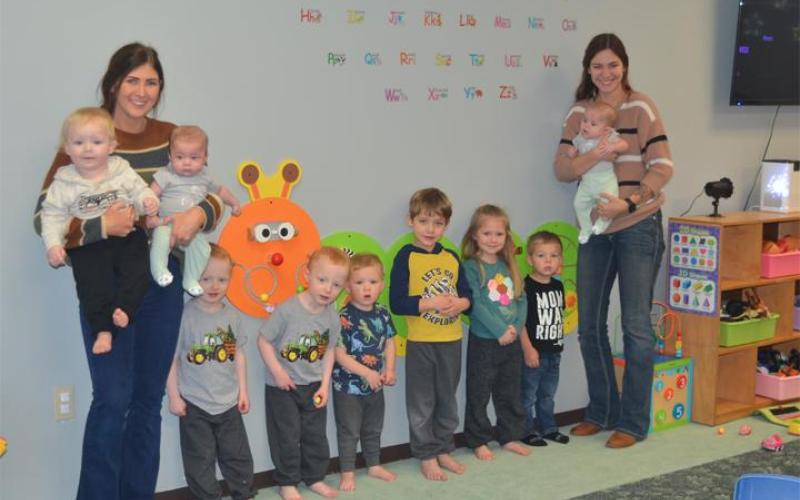Cloud County feels bite of child care crisis
There is a child care crisis in America. No community is immune, and that includes Cloud County. The strain this places on parents is exacerbating and financially draining. And the crisis is having a debilitating effect on the well-being of our nation.
For all the economic data and postulations about America's financial health – the Russian war in Ukraine, skyrocketing fuel costs, the worst inflation in 40 years – there is one sobering fact about the economy that is too often overlooked: our country cannot function properly without adequate child care.
Last year, nearly three million parents had to leave work, change jobs or turn down a job offer because of child care obligations. It's a financial drain on parents and the U.S. economy.
A report by Rachel M. Cohen for Vox.com stated that: '...already-grim trends in child care have only gotten worse since the (Covid) pandemic began. Program costs have increased, while waiting lists in several states number in the tens of thousands... nearly 90,000 fewer people are working in the child care industry compared to February 2020.'
A lack of child care options, and the cost of available child care, is pushing millions of families to the brink and forcing parents to choose between employment and staying home to take care of their children.
According to a 2018 study done by Clive R. Belfield, a professor of economics at Queens College, City University of New York, there were at least 11 million working parents of a child aged under three.
Those working parents lost on average $3,350 in earnings and in reduced productivity at work. The annual burden for those 11 million parents was $37 billion.
Over the long term, working parents lost on average $8,940 in lost earnings and reduced participation in the labor market at a cost of $98 billion.
Businesses lost on average $1,490 per working parent in reduced revenue and in extra recruitment costs. In aggregate, the burden on business was $16 billion.
It is a harsh and glaring statistic: most people are willing to work, but too many parents are at home with children because they cannot find or afford child care.
Child care can be ruinously expensive. In 28 states and the District of Columbia, one year of infant care, on average, sets parents back as much as one year at a four-year public college.
The situation in Kansas is no less distressing. An April 2022 report by Blaise Mesa of KCUR quoted Reva Wywadis, the executive director of Child Care Aware of Eastern Kansas as saying: “We used to talk about a child care shortage, and now we're talking about a child care crisis.”
Mesa went on to report that roughly 153,000 children in Kansas needed child care, yet only 74,000 spots were available statewide. Kansas lost about 800 family care homes between 2018 and 2022. The number of child care centers, which often have the largest capacity, and group child care homes remains steady. But staffing shortages and the inability to recruit new workers limit their overall effectiveness.
Like any other economic center or community, Cloud County and Concordia are feeling the bite. According to Child Care Aware of Kansas, there are 659 children under six years of age in Cloud County. Of that, 425 of those children have all parents involved in the labor force, which means those 425 children need some form of child care.
The Child Care Aware data also stated that, as of 2022, the extent of the potential demand versus the desired capacity was only 64%. The report estimated that an additional 150 child care slots were needed in Cloud County to meet the current need.
Leah Loring, a counselor at Concordia Elementary School, and her husband Michael, an online teacher, are two parents grappling with the child care uncertainty.
“We had a provider for about a year and half, and it was great,” Leah Loring said. “All the kids were able to stay together. But she's now leaving day care, so we'll be moving to a new provider in a couple days.”
The stress of finding adequate child care is only one step of the process. “When we found out our provider was leaving, it really became like a race to call first, to try and get another spot somewhere,” Loring said. “That becomes a real fear: not being able to find the right day care for your child.”
The Lorings' daughter, Emerson, will go through tribulations of her own. “She was at one place for awhile,” Loring said, “and now she's got to be thinking: why are you dropping me off at this other house full of people I don't know? It has to be scary for her, and as a parent that of course worries you so much. To her it will be a new place full of strangers, with new rules, new routines. It can be overwhelming for kids.”
Emily Hoard opened her child care center in Concordia – Em's Tots – in March of 2022. Her reason: she could not find day care for her own infant. “There's such a lack of day care in Concordia, so I decided to open my own place,” Hoard said.
Em's Tots has two full-time employees and two subs. And a waiting list. “I got six calls just on the last Sunday,” Hoard said. “The worst part of the job is turning down parents. I want to help as many of them as I can, but there's only so much you can do. Finding staff is really difficult.”
Michelle Charbonneau is the director and a teacher at the Cloud County Community College (CCCC) Children's Center. She has been with the organization since it opened in August 1986. “Most of us lifers are here because we love what we do, it's a passion for us,” Charbonneau said. “It's definitely not the money, because I think that pay is one of the biggest drawbacks to bringing new workers into the early childhood care providers field.”
The Children's Center not only provides quality care for children ages six weeks to six years, but it's also an on-campus training site for students in child care and guidance programs.
A recently completed renovation of the Children's Center has increased the capacity from 23 students to 44. “But to get there, again, we'll need to hire more qualified staff, and that's really difficult right now,” Charbonneau said.
As it is with almost all child care providers, there is a waiting list to get into the Children's Center. The dilemma seems more pressing now than it was 36 years ago, but the business of child care has also greatly evolved over the decades. “I think there's always been waiting lists, but you don't have as many at-home providers as there used to be,” Charbonneau said. “Just in our area, I think three or four in-home providers have recently retired, and that makes the situation even worse.”
Charbonneau believes one of the first steps to helping alleviate the problem is to increase the pay for child care workers. “We're just not seeing that many young people choosing early childhood care as a career, and the pay is probably one of the biggest factors.”
This past summer CloudCorp hosted three meetings in the county that focused on child care concerns. The meeting held in Clyde on June 29th was attended by a representative of the Dane G. Hansen Foundation, Child Care Aware of Kansas, USD 224, Cloud County Community College, child care providers from Concordia and Clyde, and parents needing child care in the county.
“We want all of Cloud County to be aware of the need for child care providers,” said CloudCorp executive director Nicole Reed. “Affordable, quality child care is critical when it comes to healthy growth in the economy. We are currently looking for child care providers in Cloud County. We have ideas, support, financing, and opportunities to assist anyone possibly interested. We are just one conversation away. We welcome an opportunity to discuss the options and opportunities with you.”
There are no quick fixes; no immediate stop gaps. Adequate child care is a pressing issue that will only worsen unless strong steps are taken to narrow the gap between child care needs and affordable availability.
Child Care Aware of Kansas stated: “Quality childcare benefits everyone living and working in Kansas. Just like we invest in roads, utilities, and broadband to fuel our economy and provide a good quality of life for Kansas residents, we must also invest in a more effective early care and education system for our state.”



